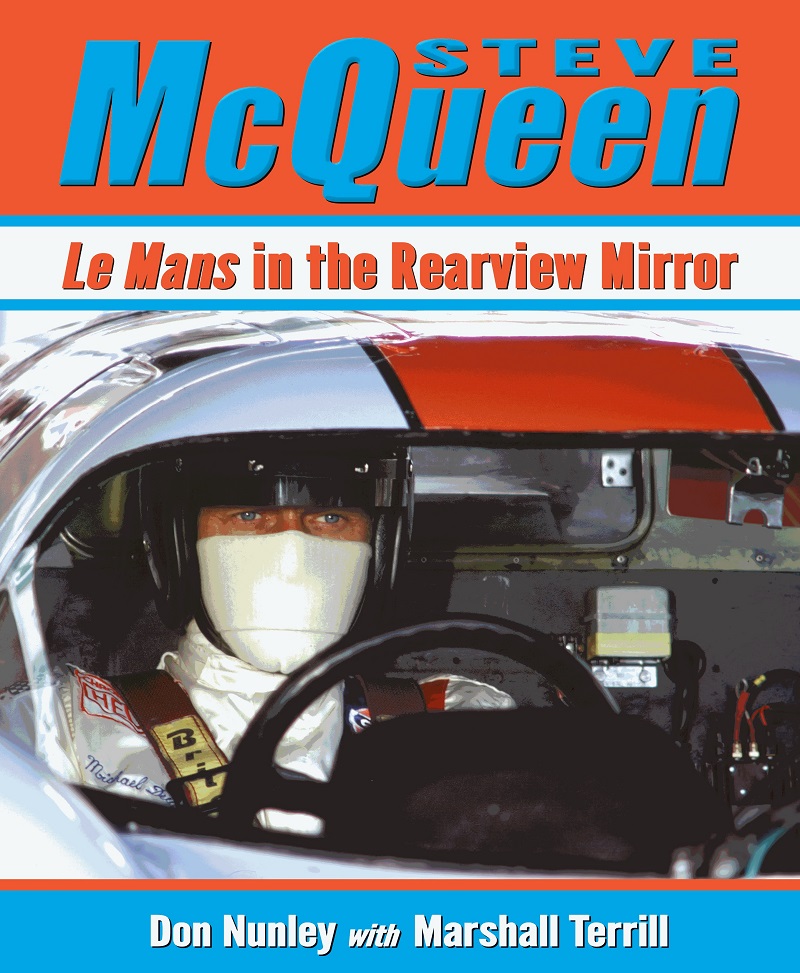
Dalton Watson Fine Books
$79.00/256 Pages/422 Images
Hardcover with Dust Jacket
ISBN: 978-1-85443-289-6
The Man. The Legend. “The King of Cool.” For decades, Steve McQueen has captured our hearts and imaginations. His canon of films is filled with classic movies such as The Magnificent Seven, The Great Escape, The Thomas Crown Affair, Bullitt, The Getaway, Papillon and The Towering Inferno.
But his career was almost derailed by a doomsday pet project that took nearly a decade to come to fruition: the ill-fated Le Mans.
As it stands, Le Mans is the most discussed, debated, examined and beloved auto racing film of all-time, which is mind-boggling if the initial reviews of the movie are read. But ask any motoring aficionado or petrol head what is their favorite racing movie of all-time, and nine times out of ten it will be Le Mans with an exclamation point.
Now Don Nunley, the property master on Le Mans and Marshall Terrill, the star’s preeminent biographer, reveals for the first time the true behind-the-scenes stories of the cult classic in Steve McQueen: Le Mans in the Rearview Mirror.
Featuring hundreds of never-before-seen color photos of the superstar in his prime and a lively narrative, Steve McQueen: Le Mans in the Rearview Mirror is an indispensable book on auto racing’s most respected film, Le Mans (1971) and one of cinema’s most beloved stars.
“It was a bumpy ride for all of us. It was the strangest picture that I ever worked on in three decades of filmmaking. And I can confirm that it was not a fun experience,” Nunley said. “What was supposed to be a simple, straightforward movie to make ended up being a five-month nightmare of epic proportions. I like to think of myself as an easy-going guy who generally looks for the silver lining in every cloud, but I’m still looking for one in this case.”
There were high hopes about the 106-minute motion picture at the time principal photography commenced in June 1970. Five months later when filming ended, there was no wrap party, no toasts, no grand farewells; every-one just quietly went away, thankful their ordeal was finally over.
Steve McQueen was an honest-to-goodness real life racing fanatic, and Le Mans was supposed to be his cinematic dream come true. But the movie left him with bitter feelings and lasting emotional dents in his armor. There were conflicts with the original director, John Sturges, personal excesses, budget woes, a war with the studio, a shutdown, months of delays, and an unfortunate accident that left one driver without a leg.
At the time, McQueen was at the height of his stratospheric popularity after an amazing string of box-office hits. Le Mans coincided with his mid-life crisis, racking up several casualties along the way. In one fell swoop, McQueen ended a 15-year marriage, severed ties with his longtime agent and producing partners, saw his production company collapse, and lost a personal fortune, not to mention control of the film he had planned to make for over a decade.
He was also in constant fear for his life after learning on the set that he was on Charles Manson’s “death list.” And at the end of the snake-bitten picture, McQueen was presented with a seven-figure bill by the Internal Revenue Service for back taxes.
Decades after crash-landing at the box-office and its savaging by critics, Le Mans has finally found the vindication and approbation its star dreamed of before it took such a wrong turn when the cameras started rolling. Steve McQueen would be astounded to see that Le Mans has left an indelible legacy in the auto racing world and movie industry.
About the Authors:Don Nunley followed his father into the film industry in 1959. He has film credits as a property master, set decorator and production designer and has been a member of the Motion Picture Academy of Arts and Sciences since 1977. Nunley also started the first product placement agency in Hollywood, working to get products into movies and TV shows, including E.T. drinking Coors beer and Tom Cruise sporting Ray Bans for Top Gun and Risky Business.
Marshall Terrill is the world’s foremost expert on Steve McQueen and the author of more than 20 books, including best-selling biographies of McQueen, Elvis Presley and Pete Maravich.
Click here for a link to our low-resolution SAMPLE PDF:
To order book, click HERE.